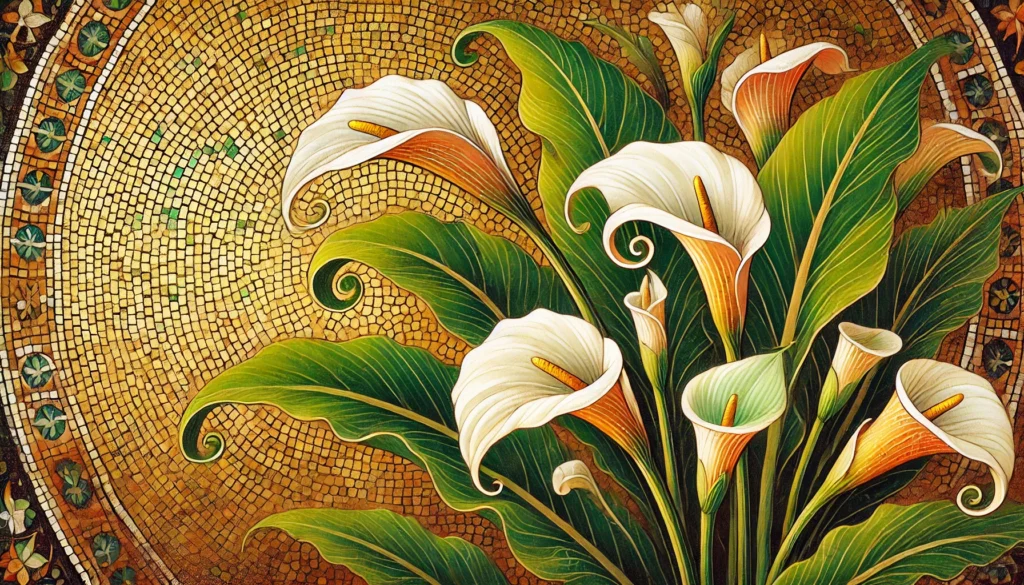

Home » Cat Plants » The Dangers of the Garden Calla Plant to Cats

The Garden Calla, also known as Calla Lily, Arum Lily, or Zantedeschia aethiopica, is a popular ornamental plant often found in homes and gardens. While these elegant flowers are visually appealing, they pose a significant threat to our feline companions.
Cats are not allergic to Garden Calla per se, but the plant is highly toxic to them. All parts of the Calla Lily contain insoluble calcium oxalate crystals, which can cause severe irritation and inflammation in a cat’s mouth, throat, and digestive tract when ingested.
Ingestion may cause mild gastrointestinal upset, but is generally not life-threatening.
Ingestion can result in mild symptoms like vomiting, diarrhea, or drooling. Rarely fatal but may require veterinary care.
Eating these plants can lead to more pronounced symptoms like abdominal pain, lethargy, or difficulty breathing. Veterinary intervention may be necessary.
Ingesting even small amounts can cause severe symptoms like organ damage, seizures, or cardiac failure without rapid treatment.
All parts of these plants are extremely poisonous to cats and can quickly lead to death, even with immediate veterinary care.
** Please note: Please note that toxicity level can vary based on the amount ingested and the specific cat. It's always best to keep these plants completely inaccessible to cats and seek immediate veterinary care or call the poison hotline if you suspect your cat has ingested any part of a toxic plant.
If your cat has ingested any part of a Garden Calla, they may exhibit several distressing symptoms. These signs usually appear immediately after consumption and can be incredibly painful for your feline friend.Common symptoms of Garden Calla poisoning in cats include:
In severe cases, the swelling can extend to the cat’s upper airway, causing difficulty breathing. If left untreated, the cat may experience dehydration and significant discomfort.
If you suspect your cat has ingested a Garden Calla, it is crucial to seek immediate veterinary care. Your veterinarian will likely follow these steps to diagnose and treat your cat:
For more information on the diagnosis and treatment of Garden Calla poisoning in cats, consult your veterinarian or visit the ASPCA Animal Poison Control Center.

A: Yes, cats can be allergic to Garden Calla. Symptoms of an allergic reaction may include itching, sneezing, and skin irritation.
A: Yes, Garden Calla, also known as Calla Lily or Zantedeschia aethiopica, is toxic to cats. Ingesting any part of this plant can cause symptoms such as vomiting, diarrhea, and drooling.
A: Symptoms of Garden Calla poisoning in cats include vomiting, diarrhea, excessive drooling, oral irritation, and difficulty swallowing. Immediate veterinary care is recommended if ingestion is suspected.
A: To prevent contact, ensure that Garden Calla is not present in your home or garden. Keep your cat indoors or monitor outdoor activities closely to avoid exposure.
A: If your cat ingests Garden Calla, contact your veterinarian immediately. Do not induce vomiting unless instructed by a veterinary professional. Immediate medical attention is necessary.
A: Yes, Garden Calla is commonly found in homes and gardens as an ornamental plant. It is important to ensure this plant is kept out of reach of cats to prevent accidental ingestion.
The Garden Calla, native to southern Africa, has a rich history and cultural significance. The name “Calla” is derived from the Greek word for beauty, “calla.” In Greek mythology, the flower is associated with the goddess Hera and is said to have sprouted from drops of her milk.
Calla Lilies have been cultivated for centuries, with records dating back to the 17th century. They gained popularity during the Victorian era as a symbol of purity and rebirth. Today, these elegant flowers are widely used in floral arrangements, weddings, and as ornamental plants in homes and gardens.
Please note: The information shared in this post is for informational purposes only and should not be considered as veterinary medical advice.
🐾 A hilarious or heart-melting cat video
🐾 Our latest paws-on review of a cool cat toy